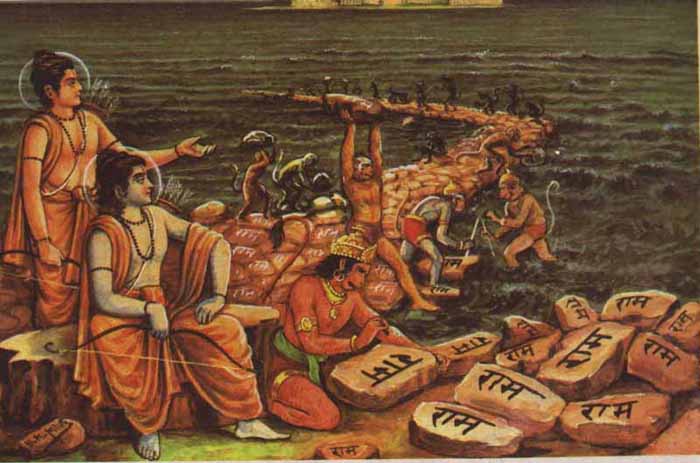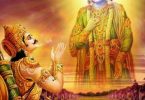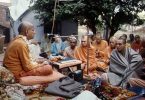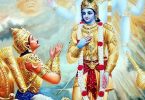Question: What was the reason for an overlap between Dvapara and Treta yuga in this chatur yuga? Any specific reason?
Answer by Romapada Swami:
The technical reason has to do with the calculation of sandhis, or junctures of time, by Vedic calculation. Different astrologers explain the rule by which the periods of time are occasionally reversed in vastly different ways. Here is one.
One Indian Astrologer, Yukteshwar, explains the ascending and descending order of the yugas which correlates to the precession of the equinox (approx. 24,000 years). He made an adjustment to the yuga years by scaling them down to “human years vs divine years” (1:360). According to his theory, after the descending yuga cycle, it will ascend once again where Dvapara and Treta yugas will again reverse positions. The ascending and descending years will total to 24,000 which is approximately equal to one cycle of precession of the equinox.
Other astrological explanations have to do with rules of time calculation when there are overlapping junctures of periods of time, or sandhis.
Below is an excerpt from HG Deena Bandhu Prabhu’s book – Vraja Lila, Part 1 which provides a puranic explanation for the switching of Treta yuga and Dvapara yuga for this kalpa.
____________
Just after Prabhupāda’s disappearance day, I went to Kathmandu. There I met a Vaiṣṇava Brahmin who told me this story. Later I went to Sitamarhi, the birthplace of Janakī, and there I met a very good friend of mine, a sādhu who has come here every Janmāṣṭamī for the past twenty-eight years celebrating Janmāṣṭamī in our temple. Although he lives in Sitamarhi, he’s a worshipper of Rādhā and Krishna. He also told me the same story, that in the beginning of the creation, Lord Brahma created seven sons from his mind. Those are known as Sapta-ṛṣi. Manasā-putra, created from the mind. At nighttime when you look to the north, you see the Big Dipper. That is the seven sages, Sapta-ṛṣi. To each of them, Lord Brahma gave a different duty. To Vasiṣṭha Muni, he gave the job of purohita of this line coming down from the sun, Sūrya-vaṁśa. Purohita means like a priest. Priest means that whenever there is a marriage sacrifice or name-giving ceremony or all these different saṁskāras, you call the priest, you pay him some money and he does some mumbo jumbo.
People don’t know the meaning of the mantras anymore. They just call the priest. They just give him some dakṣiṇā. Sometimes it’s very funny. Just like when our Dharmaputra went for his daughter’s wedding. At that time, all the old ladies there were scolding. They called one skinny little purohita priest. It’s just a business-like relationship, no sweetness was there. So this little guy is chanting all these mantras, and the old Bengali ladies are scolding him, “No, you’re chanting wrong. Not that mantra, you chant this mantra.” They knew more than him! He is purohita. So, because you do all those types of activities, you also have to suffer some sort of reaction. Prabhupāda describes this in one of the Bhāgavatam purports. We were reading the other day that when the demigods went to Viśvarūpa, he said, “No, I don’t want this job of being the priest. There’s so much reaction involved in this.” Vasiṣṭha Muni came back to Lord Brahma and said, “Wait a minute, Dad, you didn’t give me a very good deal. You give me some other service to do.” Lord Brahma said, “Look, I’ve already given out all of the services. You just please do this service, I have no one else. I promise you that if you do this service, one day the Supreme Personality of Godhead Himself will come in the form of Lord Rama, and you’ll be the purohita for the Supreme Personality of Godhead. Then you’ll be free from this duty.” Then Vasiṣṭha Muni was satisfied and accepted this duty. Lord Brahma was also satisfied that the son is ājnākārī. Just like we chant every day one of the aparādhās, guru-avajnā. So, the opposite of avajnā is ājnākārī, one who follows the order. You don’t see this in Western countries, but in India you can see how sons are very obedient to their father. Our Śamīka Ṛṣi is sitting here, he knows. They’re very obedient. Lord Brahma said, “All right you take some benediction.” Vasiṣṭha Muni said, “All right, but when this Lord Rama appears that’s Tretā-yuga. Now it is Satya-yuga, then comes Dvāpara-yuga, then comes Tretā-yuga, so that is many millions of years. I have to wait a long time before I get free from this duty.” Lord Brahma is very intelligent, he could understand. He said, “All right vatsa, all right my dear son, for you we’ll switch, this particular kalpa, we’ll switch the yugas around. Dvāpara-yuga will come after Tretā-yuga, then you won’t have to wait so long.” So Tretā-yuga came, and then Dvāpara-yuga. Ordinarily Dvāpara, Tretā and Kali. Just this particular kalpa has been switched around for Vasiṣṭha Muni.
HG Deena Bandhu. Vraja-Lila Part One (p. 47).







